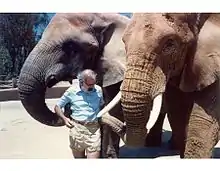Jeheskel Shoshani
Jeheskel "Hezy" Shoshani (January 23, 1943 – May 21, 2008) was an evolutionary biologist who studied elephants and their relatives for over 35 years.
Jeheskel Shoshani | |
|---|---|
 | |
| Born | January 23, 1943 |
| Died | May 21, 2008 (aged 65) |
| Cause of death | Terrorism-linked explosion on a public minibus |
| Other names | "Hezy" Shoshani |
| Known for | Specialist in proboscidean anatomy and evolution Advocate of elephant conservation Founder of Elephant Research Foundation |
| Spouse(s) | Sandra Lash Shoshani |
| Scientific career | |
| Institutions | 1973-1998 Wayne State University in Detroit, Michigan 1998-2006 University of Asmara in Eritrea 2006-2008 Addis Ababa University in Ethiopia |
| Thesis | On the Phylogenetic Relationships Among Paenungulata and Within Elephantidae as Demonstrated by Molecular and Osteological Evidence (1986) |
Life and work
Early life and career
Shoshani was born in what is now Tel Aviv, Israel, but he held dual citizenship in the United States.[1] His interest in elephants began in his youth after he read a Hebrew copy of Willis Lindquist's Burma Boy,[2][3] which told the story of the relationship between a boy and an elephant.[4] He began his career as a zookeeper,[3] and went on to research elephants in Sri Lanka and Kenya[4] before moving to Detroit, Michigan in 1968[5] and becoming an undergraduate professor at Wayne State University around 1973.[6] Shoshani founded the Elephant Interest Group (later known as the Elephant Research Foundation) in June 1977,[1] and was the sole editor of its official magazine, Elephant (formerly Elephant Newsletter), for most of its run.[6] He also established the Elephant Research Foundation Library, through which he collected and cataloged published and archival materials, displays, and biological samples relating to elephants.[2] Shoshani was awarded his PhD from the university in 1986,[5] and taught there until he moved to Eritrea in 1998. There, he studied a poorly-known population of African bush elephants that were threatened by conflicts between Eritrea and Ethiopia[3][6] and taught at the University of Asmara until 2006.[6] Concerned about the danger of the Eritrea-Ethiopia border area,[4] he moved to Ethiopia in 2007 to continue his research, and taught at the University of Addis Ababa.[3]
Research
During his life, Shoshani published over 168 scientific articles and books on elephants.[3] His research focused primarily on their anatomy and taxonomy, but he also studied other taxa like primates.[1] Notably, he led an extensive dissection of a 46-year old female Sri Lankan elephant named Iki from 1980-1988,[2][7] coauthored landmark papers on the elephant brain[8] and vision,[9] and was the editor and coauthor of two encyclopedic volumes on elephants and their relatives: the technical The Proboscidea: Evolution and Palaeoecology of Elephants and Their Relatives, and the laymen-oriented Elephants: Majestic Creatures of The Wild.[1][3] He was also partially or wholly responsible for naming multiple proboscidean taxa, including the suborder Plesielephantiformes,[10] the family Numidotheriidae,[11] and the species Eritreum melakeghebrekristosi.[12]
Death and legacy
Shoshani was among several people killed in a terrorism-linked explosion in a public minibus in downtown Addis Ababa, Ethiopia on May 21, 2008.[4] Following his death, The Elephant Research Foundation board of directors renamed the library to The Jeheskel (Hezy) Shoshani Library Endowed Collection to commemorate his research,[6] and it currently houses over 1,100 items.[2] The amebelodontid Eurybelodon shoshanii was named in his honor in 2016.[13]
References
- Dale, R. (2008). "Tribute: In Memoriam, Jeheskel "Hezy" Shoshani". Journal of the Elephant Managers Association. 19 (2).
- Zoski, S. (2018). "Packing up a Pachyderm". Wayne State. Vol. Fall 2018.
- Douglas-Hamilton, I. (2008). "A tribute to Hezy Shoshani". Pachyderm. 44.
- Ofri Ilani (May 22, 2008). נהרג חוקר פילים ישראלי בפיגוע באתיופיה [Israeli researcher of elephants killed in attack in Ethiopia]. Haaretz (in Hebrew). Associated Press. Retrieved August 13, 2014.
- Shoshani, J. (1986). On the Phylogenetic Relationships Among Paenungulata and Within Elephantidae as Demonstrated by Molecular and Osteological Evidence (PhD). Wayne State University.
- "The Jeheskel (Hezy) Shoshani Library Endowed Collection". Special Collections. Wayne State University Library.
- Shoshani, J.; et al. (1982). "On the Dissection of a Female Asian Elephant (Elephas maximus maximus Linnaeus, 1758) and Data from Other Elephants". Elephant. 2 (1). doi:10.22237/elephant/1521731887.
- Jeheskel Shoshani; WIlliam Kupsky; Gary Marchant (June 30, 2006). "Elephant brain: Part I: Gross morphology, functions, comparative anatomy, and evolution". Brain Research Bulletin. 70 (2): 124–157. doi:10.1016/j.brainresbull.2006.03.016.
- Shozo Yokoyama; Naomi Takenaka; Dalen W. Agnew; Jeheskel Shoshani (May 1, 2005). "Elephants and Human Color-Blind Deuteranopes Have Identical Sets of Visual Pigments". Genetics. 170 (1): 335–344. doi:10.1534/genetics.104.039511. PMC 1449733. PMID 15781694.
- J. Shoshani; W. J. Sanders; P. Tassy (2001). "Elephants and other Proboscideans: a summary of recent findings and new taxonomic suggestions". The World of Elephants - International Congress, Rome 2001: 676–679.
- Shoshani, J., ed. (1992). Elephants: Majestic Creatures of the Wild. London: Simon and Schuster. p. 22-23.
- J. Shoshani; R. C. Walter; M. Abraha; S. Berhe; P. Tassy; W. J. Sanders; G. H. Marchant; Y. Libsekal; T.Ghirmai; D. Zinner (2006). "A proboscidean from the late Oligocene of Eritrea, a "missing link" between early Elephantiformes and Elephantimorpha, and biogeographic implications". Proceedings of the National Academy of Sciences. 103 (46): 17296–17301. doi:10.1073/pnas.0603689103.
- Lambert, W. (2016). "Eurybelodon shoshanii, an unusual new shovel-tusked gomphothere (Mammalia, Proboscidea) from the late Miocene of Oregon". Journal of Vertebrate Paleontology. 36 (3). doi:10.1080/02724634.2016.1091352.
External links
- Burma Boy by Willis Lindquist on Internet Archive
- Elephant, the official scholarly organ of the Elephant Interest Group